'I can't afford the medical cannabis keeping my epileptic son alive'
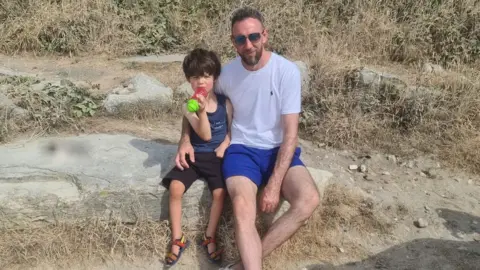 Matt Hughes
Matt HughesFamilies of children with severe epilepsy say they feel helpless because they can't afford the medical cannabis keeping their children alive.
Medical cannabis was legalised four years ago, but only a small number of NHS prescriptions have been issued.
Matt and Ali Hughes, who live in Norwich, are paying £600 a month for cannabis oil called Celixir20 for their five-year-old son, Charlie.
Charlie has a rare form of treatment resistant epilepsy called West syndrome, which has left him with developmental delay.
He was having up to 120 seizures a day before he started on medical cannabis in May 2019, but is now mainly seizure-free.
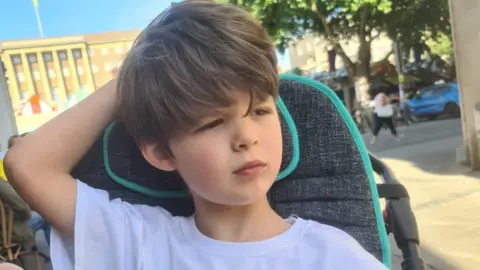 Matt Hughes
Matt HughesCharlie started off on Bedrolite, which cost the family £1,000 a month, but switched to the cheaper Celixir20, which is imported from Israel. However, it might not be available from the new year.
The Medicines and Healthcare products Regulatory Agency (MHRA) says it is working to resolve the supply issue but Matt is still concerned.
"Charlie's life has been transformed on this drug," his father Matt says. "We simply cannot afford the more expensive version so we are facing going back to square one and putting Charlie's life in danger.
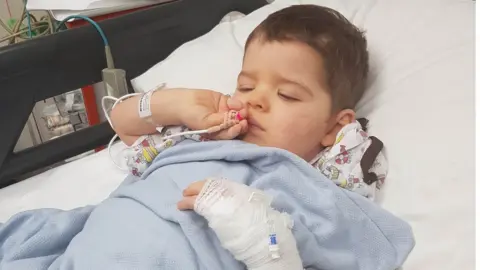 Matt Hughes
Matt Hughes"We have had to move to a bungalow because of Charlie's mobility needs so we have a bigger mortgage and we have to pay for private therapies. My wife and I both work but we just can't find the extra money.
"Charlie is hitting milestones we thought would never be possible. He is nearly walking, he has started school and his happy personality is shining through, but all that learning could end because the seizures wipe his memory."
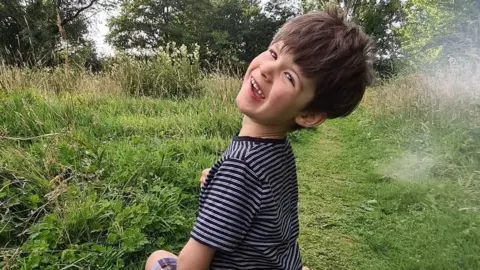 Matt Hughes
Matt HughesDoctors have refused to prescribe either drug for Charlie, despite the law change in 2018 allowing medical cannabis to be prescribed.
The National Institute for Health and Care Excellence (NICE) produced guidance at the time saying there was not enough evidence to recommend cannabis-based medicines for severe epilepsy.
After Matt and Ali started a legal challenge, NICE clarified the guidance to add there was "no recommendation against the use of cannabis-based medical products".
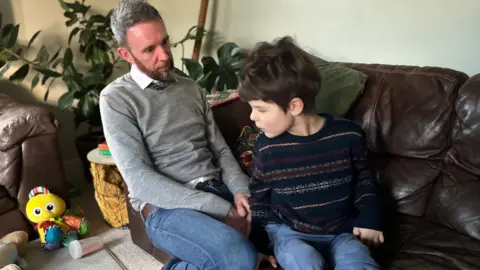 Shaun Whitmore/BBC
Shaun Whitmore/BBCBut the British Paediatric Neurology Association (BPNA) produced further guidance which Matt describes as "a fundamental block with cannabis being a last resort".
"Doctors are too scared to prescribe. The NHS and BPNA should be considering a harm reduction approach to prescribing unlicensed cannabis medicines rather than forcing families to other routes.
"As a parent I feel completely helpless. We are in absolute despair. Charlie is finally stable in his health but I feel like he will be back in intensive care from next year. There is nothing we can do and I lie awake worrying about it every night."
Matt founded MedCan Support, a non-profit community interest company, which supports more than 600 families of children using medical cannabis.
MedCan also supports Steph and Jon Micklesen, from Woodbridge in Suffolk, who are spending £1900 a month on their six-year-old son Rocco's cannabis.
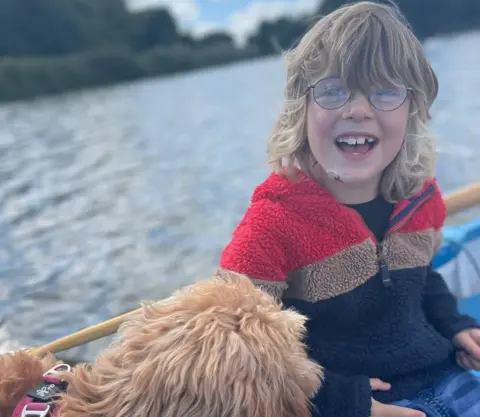 Micklesen family
Micklesen familyRocco has a rare form of epilepsy and was having multiple seizures a day before starting on Celixir20 at a cost of £800 a month.
"My husband said we should try it, I didn't believe it and had to see it with my own eyes," Steph says.
When they struggled to get hold of the medical cannabis recently they had to move on to Bedrolite at a hugely increased cost.
"I'm a social worker and my husband is a plumber so we're really struggling and wondering how we can afford this. My wages are all gone every month paying for his medical cannabis and we are getting into debt.
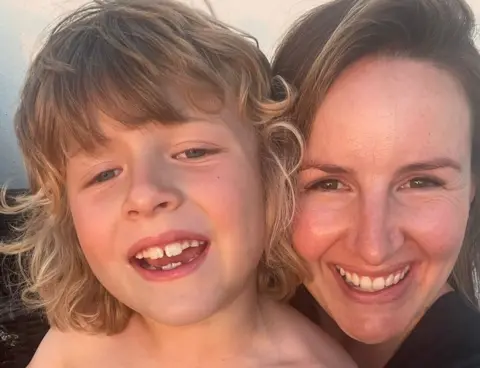 Micklesen family
Micklesen family"We've talked about selling our house but all our family is here. I think we will have to start fundraising in the new year," Steph says.
When the family first got the private prescription, they hoped the NHS would agree to prescribe it once they saw how well Rocco was doing.
Instead, Steph says the NHS tried to discharge Rocco until the family made a complaint and they were assigned a new specialist. But there's still no sign of an NHS prescription in the future, she adds.
"I don't know what more we can do. We don't understand why our son isn't important enough to get the right medical help," Steph says.

What is medical cannabis?
- Medical cannabis is a broad term used by doctors to describe treatments - such as oral tablets, oils and sprays - that have some similar ingredients to recreational cannabis
- These products are made by pharmaceutical companies under the same strict controls as other medications, meaning they have to be prescribed
- Epidyolex, a cannabis oil approved for certain rare types of epilepsy, was prescribed by the NHS about 200 times last year
- Some families say they can't access epidyolex while others say it does not work for their children because it does not contain any THC - the psychoactive element of cannabis
- Unlicensed cannabis oils which include THC are almost completely inaccessible unless families pay privately, with just three NHS-funded prescriptions issued so far
Source: MedCan

A mother whose son received one of the first NHS prescriptions for medical cannabis has set up a scheme asking manufacturers to supply it for free for a certain period to help families.
Charlotte Caldwell, from County Tyrone, organised for Marie Siddans, from Dunmow, Essex, to get free medical cannabis for her 15-year-old son Harry and her 13-year-old daughter Rose, who both have epilepsy.
 Siddans family
Siddans familyHarry has been using medical cannabis for two and a half years, at a cost of up to £1500 a month. It has allowed him to live without seizures, walk - and go to school.
"We have spent over £30,000 to keep Harry well so far. No other drugs were working for him. He was lifeless and I was told to lower my expectations for him until we tried medical cannabis and he just came back to life.
"When we found out that we would be getting it for free, it felt like we had won the lottery," Marie said.
"Until now we haven't been able to afford it at all for Rose and she has multiple seizures a day so we are excited to see what difference it will make to her symptoms."
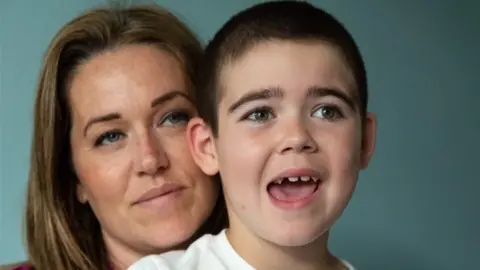 Hannah Deacon
Hannah DeaconHannah Deacon successfully campaigned alongside Charlotte Caudwell to legalise medical cannabis to help with her son Alfie's epilepsy.
Alfie has been seizure-free for the last few years and his quality of life has drastically improved, according to Hannah, who co-founded MedCan with Matt.
"Alfie is actually saving the NHS money by being well enough to stay out of hospital, and it has meant that I have been able to go back to work, which has also transformed my mental health," she says.
Hannah, of Kenilworth, Warwickshire, hoped the case would help other children get access to the medication that has transformed her son's life. But she feels "devastated" this has not happened.
More than 700,000 people have signed her petition calling for better access to medical cannabis for epileptic children.
 Hannah Deacon
Hannah Deacon"We have seen hugely restrictive guidance from NICE which is making doctors and trusts too scared to issue a prescription," she says.
"We are told that they can't be issued due to a lack of research but these children do not have time to wait for research to be fully completed.
"There is a vast amount of real world evidence and observational data which NICE should be considering."
A spokesperson for NICE said: "Until there is clear evidence of the safety and effectiveness of cannabis-based medicinal products, specialist doctors need to consider individual patient circumstances, clinical condition and need, and to weigh up, with the patient or carer, the relative risks and benefits in choosing treatments."
A spokesperson for the BPNA said: "Our members are enormously sympathetic to families who care so wonderfully for children with complex and drug resistant epilepsies.
"Although the BPNA are able and regularly talk with governmental organisations and registered charities, we are unable to respond to queries regarding our position on cannabis based medicinal products."
MHRA chief healthcare, quality and access officer, Dr Laura Squire, said: "We recognise the importance of these cannabis oil products for children with severe forms of epilepsy.
"That is why we have enabled continued patient access to them by accepting applications to import. No parent should have cause for concern about ongoing supplies.
"We continue to work with the importer of Celixir20 to try to resolve concerns about non-compliance with UK standards.
"Whilst the current agreement extends to the end of this year, this timeline will be extended should it prove necessary in the interest of individual patients' health."

Find BBC News: East of England on Facebook, Instagram and Twitter. If you have a story suggestion email [email protected]
